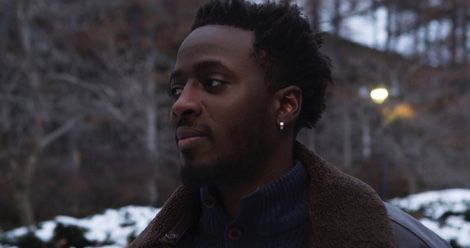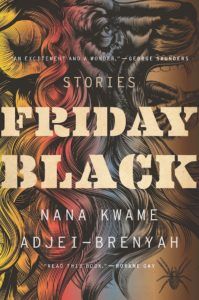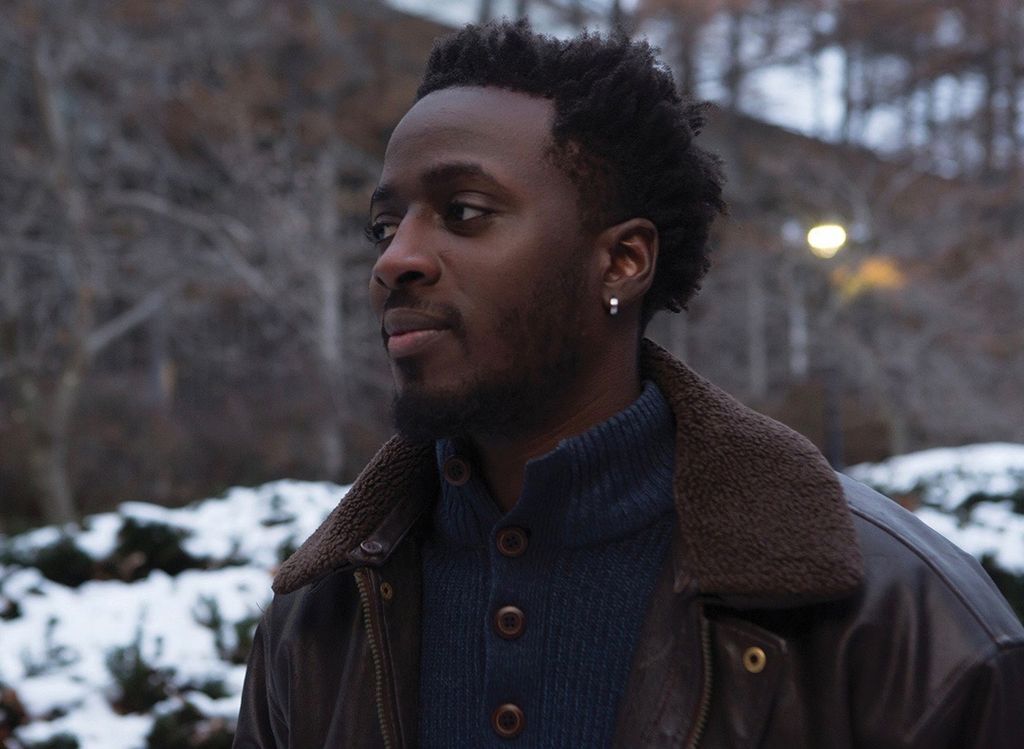
FRIDAY BLACK Author Nana Kwame Adjei-Brenyah Talks Genre, Violence, Anime, and Hogwarts Houses
Friday Black is the unforgettable debut short story collection from New York native Nana Kwame Adjei-Brenyah. These unique stories explore racism, violence, consumerism, and other topics of political and cultural unrest through the lens of the uncanny. The book has only been out for a few months and is already garnering accolades from critics and readers everywhere, and for good reason. I was really excited to have the opportunity to chat with the author recently. Amongst other things, we talked genre, anime, and of course, Harry Potter. Check it out.

Nana Kwame Adjei-Brenyah: I feel a lot of things. Some parts are weird. Like, I think I’m way too awkward to be having my picture taken this much. Some parts are super overwhelming. Some parts are really humbling. It’s a lot of stuff, but I’m grateful, mostly.
EM: What got you into writing work that has a dystopian and often horror-esque bent to it rather than dealing with these topics in a more realistic way?
NKAB: Going into this, I didn’t think, “Let me try to write dystopian fiction.” I think I just sort of create spaces that I know I can create energy from. So if that ends up feeling like dystopia, I guess that’s just what happens. But what I do like is sometimes turning the volume up on something so that you can’t ignore it. Or pushing the needle just a little bit, shining a light on whatever issue. I like to be right in that space where it feels maybe hyperbolic or maybe not. Someone once said, the stories are asking, “Which world is dystopia? Mine or yours?” And I really like that kind of energy.
EM: So then did it surprise you when people started talking about this collection as dystopian, or were there any descriptions of this collection that have been surprising to you?
NKAB: You know, not really, because I’m sort of used to hearing it. I got an MFA, so I’m aware of how the literary world in general has a weird hierarchal thing going on. I came in not super aware of it, and I try to keep myself less aware. But I’m not super surprised by anything that has classified it as “speculative” or “sci-fi” or “dystopian” or whatever. I’m cool with it. I don’t think of those terms as pejorative in any sense, but I also don’t think of those things myself while I’m writing.
I just write whatever a story needs, but I did spend a lot of time with the surreal, or I guess stories that were outside the realm of straight literary fiction or straight reality. I spent a long time wondering if they could coexist in a cohesive book with stories that are a little bit more bound to reality or at least closer to reality. Working with George Saunders, I asked him, “Should I be this kind of writer, or should I be that kind of writer?” And he just said, “Yes.” And that was very helpful for me.
EM: I definitely understand that. I’m currently going through a writing program myself, and I think in literature programs and MFA programs, you’re always hyper-aware of categories. So then you start categorizing your own writing, or at least you feel pressured to categorize your writing.
NKAB: Yeah, I feel like writing’s already hard, and when you think about the whole genre thing, how does that manifest itself in the process? Do you have to say, oh wait, this isn’t sci-fi enough; let me add something? Write what you want to write. Some writers who write what is labeled “genre fiction” create these premises and become so enamored with the coolness of the premise that that’s where the stories lies. But really, stories don’t happen on the premise level. In Game of Thrones, it doesn’t matter how many dragons you have. We care about the connections happening between these families. It doesn’t matter if it’s fantasy, sci-fi, or whatever you want to talk about. To me, those are just tools to squeeze a little bit more out of your characters.
I think the genre stuff is mostly a selling tool. And on the other side, in the literary fiction world, I think people try to overcorrect and try to not be genre. I think sometimes literary fiction is sort of just like, how boring can you be and still be good? “Well, nothing happened in this book, but I just liked it.”
EM: A the end of the day, you can be a beautiful writer, but if nothing’s happening what’s the point?
NKAB: I agree, but I think almost as a point of pride some authors try to do that thing where either nothing happens or it’s just like, you know, some middle-aged divorce. Which is a worthy thing to talk about, but the idea that that topic should be more important than anything else, it’s weird.
EM: So as a teacher of creative writing, what do you say to your students who want to write things that are more genre-based?
NKAB: I definitely never push them away from it. I have students who want to write all kinds of crazy stuff, and I’m excited when I hear it. I tell them go for it. I always tell them it’s all about the execution. Execute the story. You can write a story about dragons and robots and zombies that could be awful, or it could be the greatest thing I’ve ever read. Just write the story and know that just the fact of including those things isn’t going to make it a good story though.
I was telling this to my students today, actually. I’ve had teachers that tried to steer me away from the types of stories I do, and what would have happened if I had listened to them? Write what you want to write. Do what you want to do. Make it sing, and it will be good. It’s important to me to encourage my students to do what they want to do.
EM: Reading this collection, I could really feel a lot of non-literary influences in your writing. Like maybe a little bit of cinema and television crept in there as well.
NKAB: Yeah.
EM: Could you talk more specifically about what some of those influences were?
NKAB: Yeah, I grew up reading a lot of serial sci-fi and fantasy. I read Animorphs as a kid. I’m from the Harry Potter generation. But outside of books and stuff, I love anime, from Dragonball-Z to more cerebral stuff like Death Note or this anime called Monster. Miyazaki stuff as well. And what’s cool about that is I was made to view those things as valid for a lot of high-level thought. It’s funny because when you see parodies of anime, there will be people in the middle of fights having really philosophical debates. Anime is really big on that, and that was important to me. When there’s violence, it’s very much couched in “this is why,” and that rubbed off on me, I think.
EM: At Book Riot, we have a lot of readers who are big Harry Potter fans, so since you mentioned it, what’s your Hogwarts house?
NKAB: I’m a Gryffindor, officially through Pottermore. I’m pretty proud of it, but I try to be cool about it. I don’t want to make other people feel bad. I can also tell you my patronus through Pottermore is a dolphin. My wand is vine wood with phoenix feather. This is official. I want to say it’s 13 inches, but I’m not positive about that.
EM: So you just finished your first book tour. How did it go?
NKAB: It’s been incredible. I’ve seen so much of the country that I’d never even been close to seeing before. I’ve spend most of my life within miles of where I was born. I was born in Queens, New York. And I’m from right outside of the city in Spring Valley. It’s been amazing, but it’s also been incredibly tiring. I didn’t realize how physically and emotionally brutal touring is, but it’s also been very rewarding. The space between each event will kill you, but the events themselves resurrect you; they give you life.
EM: On tour, are there certain questions you’ve gotten over and over again that you’re tired of answering? Or were there any especially interesting questions you got?
NKAB: Everyone asks some sort of version of the “why not write in reality” question, but I’m not really tired of answering it because it gives me an opportunity to talk about something important. One student asked me about the story “Lark Street.” She just asked: “Why?” And I told her, you know, that’s a good question. And it gave me a chance to talk about the fact that I think the taboo we have on abortion is sort of like a violence itself. But I thought that it was a good question, and I appreciated it.
EM: Violence is a big theme throughout this book. Why for you is that a topic that’s important to explore?
NKAB: I think it’s sort of like, you know, if the house is on fire, I’m not going to talk about what’s in the fridge. If people are getting killed around me, that’s something I care about and have to talk about. And so maybe I have to be violent on the page to represent that meaningfully. And on some level, getting people to react to violence on the page is part of the project of the book because there’s already violence that I don’t feel like we’re reacting to. I’m just trying to be as ethical as possible when creating this violence as I can be, and I try my best to do different things to make sure it’s done purposefully. I guess the short answer is we’re all just violent, and I think that’s a problem, so my stories are violent, and I think that can be purposeful and helpful.
EM: It’s so strange that the idea of violence being bad has become this political issue with sides.
NKAB: I’m kind of just saying don’t step on people’s heads anymore. You stepped on that guy’s head, whether it’s because you wanted a shirt or because of a part of his identity, because of race, gender, sexuality, religion, all these different things. I’m saying, you stepped on that guy’s head; don’t do that. Whoa, what a crazy political take, you know? I’m literally just saying maybe we should murder each other less.
EM: I’m guessing our political climate in the U.S. has changed a lot from where we were when you started working on this short story collection.
NKAB: Yeah, I mean, the big difference for me with politics now is that everything is right in front of your face every day. I wrote all of these stories before Donald Trump was elected, and with him we have a president who, I don’t know, doesn’t have the mental capacity or willingness to be decent about anything. So the mouthpiece can’t hide the horror that is everywhere as well as what has been possible before. But a lot of the things I’ve been talking about are sort of fundamental issues. Like, that guy has everything. That guy right next to him has nothing. What about that? But I did write this collection before this current moment where we all have this world we’ve created looming over our head like a guillotine. I wrote this before these issues became more obvious, I guess.
EM: Do you feel like current politics are affecting your writing at all?
NKAB: I don’t know that they are, but I’m sure that they will.
EM: Right, you’re probably not sitting there thinking, “I’m writing this in response to Donald Trump.”
NKAB: No, there’s none of that, but I’m sure some of it will leak in.
EM: I read that you worked retail.
NKAB: Yes, for a long time.
EM: I know that we just recently had Black Friday here in America. Do you have crazy Black Friday flashbacks every time it comes up from your time working retail?
NKAB: Yeah, I didn’t have any crazy violent stories. The store where I worked had sort of crazy practices that weren’t all super legal. I came in at 10am on Thanksgiving day and wouldn’t leave until 9pm that night. I would get three thirty-minute breaks and they would feed us pizza and five-hour energies. By the time we left, I would feel almost like drunk. I didn’t like it at all.
EM: Since we’ve said goodbye to 2018 and are welcoming in the beginning of 2019, I wanted to ask you one last best-of-the-year related question. What were some of your favorite things of 2018? Books, movies, anime, whatever.
NKAB: Okay. For the anime people, this is going to seem kind of basic, but I did think some of the mainstream stuff was really great this season. Attack on Titan was really great to me. My Hero Academia (or Boku no Hiro) was really good this season in 2018. J. Cole’s album KOD came out this year. I liked KOD. Oxnard by Anderson Paak.
And so many books. Freshwater by Akwaeke Emezi. Heads of the Colored People by Nafissa Thomspon-Spires. Fruit of the Drunken Tree by Ingrid Rojas Contreras. Incendiaries by R.O. Kwan. These are all debuts. Red Clocks by Leni Zumas is not a debut, but it was really good too.
People who are cool also have been great this year. My friends have been super dope. They’ve supported me, and to me my close personal friends are a big reason why this book has been able to do what it’s done. They’ve been great. My publicist, my agent, my editor, my friends; they’ve been dope.
EM: Thanks so much for doing this interview. I loved Friday Black and look forward to seeing what you do next!
NKAB: Thanks, I’m going to try my best!
Black Friday is available right now, and if you haven’t read it yet, go get it immediately!












